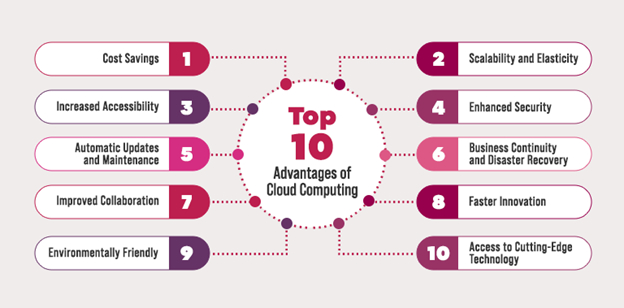
Cloud computing has revolutionised the way businesses operate, offering a dynamic and cost-effective solution for data storage, application access, and IT infrastructure. But is it the right career path for you? This article dives deep into the cloud advantages, explores career options, and equips you with the knowledge to harness the power of the cloud and eventually define the question, what is Cloud Computing Course? Stating the advantages of cloud computing. This article gives information with regard to Amrita AHEAD online programs with regard to both undergraduate and postgraduate courses in computer applications. Amrita AHEAD initiates its students to be knowledgeable in emerging fields such as cloud computing through this article.
A cloud architect designs, builds, and manages cloud computing systems. They ensure these systems are secure, scalable, and meet the needs of the organisation. However, a AI Cloud Architect is a specialised role focusing on designing and implementing cloud-based solutions that leverage artificial intelligence, with course fees that is considerable. Cloud architect course fees range widely depending on the provider and content depth, but can start as low as ₹1,000 for basic certifications.
What is Cloud Computing Course?probing deep into the dearth of what exactly cloud computing is reveals a new area in computing industry that is currently experiencing explosive growth, with a projected market . This translates to a surge in demand for skilled cloud professionalshough cloud architect course fees may differ. If you’re passionate about technology and enjoy problem-solving, a cloud computing career offers exciting opportunities.
The Indian IT sector is experiencing a massive surge in cloud adoption. What is the potential impact created by cloud computing on newer technologies, creating a booming job market for cloud professionals. Here’s why cloud computing can be a great career choice in India:
Here’s a quick breakdown of average cloud computing salaries in India (INR):
|
Career Path |
Description |
Key Skills |
Estimated Monthly Salary (INR) |
|
Cloud Solutions Architect |
Designs and implements cloud solutions to meet business needs. |
Cloud platform architecture, Business acumen, Scripting |
₹1,00,000 – ₹2,00,000 |
|
Cloud DevOps Engineer |
Automates the development, testing, and deployment of cloud applications. |
DevOps tools (e.g. Jenkins), Cloud platforms, Scripting |
₹80,000 – ₹1,50,000 |
|
Cloud Security Engineer |
Ensures the security of cloud environments and data. |
Security best practices, Networking, and cloud platform security |
₹70,000 – ₹1,20,000 |
|
Cloud Data Engineer |
Builds, manages, and secures cloud data pipelines and infrastructure. |
Data warehousing, Big Data technologies, and cloud platforms |
₹80,000 – ₹1,40,000 |
|
Cloud Automation Engineer |
Automates tasks and workflows within cloud environments. |
Scripting (e.g. Python), Cloud APIs, and cloud platforms |
₹70,000 – ₹1,20,000 |
|
Cloud Network Engineer |
Designs, implements, and manages cloud networks. |
Network protocols, Cloud networking services, Scripting |
₹60,000 – ₹1,00,000 |
|
Cloud Application Developer |
Develops and deploys applications specifically designed for the cloud. |
Programming languages, Cloud development frameworks, Cloud platforms |
₹60,000 – ₹1,00,000 |
|
Cloud Cost Optimization Specialist |
Optimizes cloud resource usage to reduce costs. |
Cloud costing models, Cloud platform monitoring, Scripting |
₹65,000 – ₹1,10,000 |
|
Cloud Integration Specialist |
Integrates cloud-based applications and services. |
APIs, Integration tools, Cloud platforms |
₹55,000 – ₹90,000 |
|
Cloud Support Engineer |
Provides technical support for cloud-based applications and infrastructure. |
Troubleshooting, Scripting, Cloud platform basics |
₹50,000 – ₹80,000 |
Cloud computing services come in various deployment models to cater to specific business needs:
Cloud Deployment Model
Description
Public Cloud
Shared resources, cost-effective, ideal for non-critical workloads.
Private Cloud
Dedicated infrastructure, high security, ideal for sensitive data.
Hybrid Cloud
Combination of public and private clouds, offers flexibility and control.
Multi-Cloud
Utilizes multiple public cloud providers, enhances redundancy.
Cloud computing refers to the on-demand delivery of IT resources – servers, storage, databases, software, networking – over the internet. Users access these resources through a web browser or mobile app, eliminating the need for physical infrastructure on-site.
Cloud computing offers a wide range of functions, including:
There are mainly three types of courses in the field of cloud computing these cloud computing courses fees have different when it comes to the time taken for completion aas well as fee structure.the given below is a look upon the major types of courses that we can find in the case of cloud computing with an estimated fee structure in INR.This might be an approximate figure which can be referred to in the initial stage of learning the course.cloud computing courses fees
Are different in different contexts
|
Course Type |
Fee Range (INR) |
|
Free Courses |
Free |
|
Certificate Courses |
₹1,000 – ₹10,000 |
|
Diploma/Degree Programs |
₹50,000 – ₹2,00,000 |
Now, let’s explore the compelling advantages that make cloud computing a game-changer for businesses:

Advantages of Cloud Computing
Several online MBA programmes in India integrate cloud computing into their curricula. Amrita Vishwa Vidyapeetham’s Amrita AHEAD offers a well-regarded MBA in Cloud computing with an industry-aligned curriculum.
In the Amrita AHEAD online programs you can expect courses touching on cloud concepts within their general MBA Program.Earning an MBA in Cloud Computing can provide you with a strong foundation in business principles while simultaneously diving deep into cloud computing concepts.An MBA in cloud computing can prepare you to bridge the gap between business strategy and technical implementation in the cloud.A BCA graduate with a cloud computing focus can expect a bca cloud computing salary range of ₹3-5 Lakhs per Annum (LPA) in India.
Amrita AHEAD Online BCA Program doesn’t explicitly mention a dedicated cloud computing specialization within the BCA program with attractive bca cloud computing salary. However, it highlights courses related to computer networks, databases, and programming languages – foundational knowledge valuable for cloud computing.MCA Online Program also has cloud computing in syllabus.Youngsters are studious to know bca cloud computing salary as this is an emerging field.
This article shows what is cloud advantages are and also various areas where cloud computing is advantageous, unlocking a new era of efficiency, scalability, and security. Cloud computing empowers them to focus on core competencies while leaving IT infrastructure management to the experts. In conclusion, cloud computing presents a compelling value proposition for businesses seeking to optimise their operations and thrive in the digital age. If you’re considering a career in technology, cloud computing offers a rewarding path with immense growth potential.
You May Like